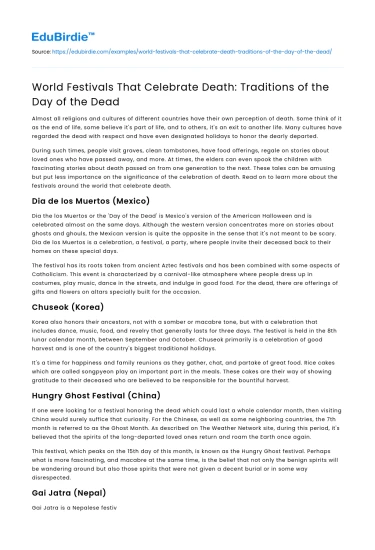Almost all religions and cultures of different countries have their own perception of death. Some think of it as the end of life, some believe it's part of life, and to others, it's an exit to another life. Many cultures have regarded the dead with respect and have even designated holidays to honor the dearly departed.
During such times, people visit graves, clean tombstones, have food offerings, regale on stories about loved ones who have passed away, and more. At times, the elders can even spook the children with fascinating stories about death passed on from one generation to the next. These tales can be amusing but put less importance on the significance of the celebration of death. Read on to learn more about the festivals around the world that celebrate death.
Save your time!
We can take care of your essay
- Proper editing and formatting
- Free revision, title page, and bibliography
- Flexible prices and money-back guarantee
Dia de los Muertos (Mexico)
Dia the los Muertos or the 'Day of the Dead' is Mexico's version of the American Halloween and is celebrated almost on the same days. Although the western version concentrates more on stories about ghosts and ghouls, the Mexican version is quite the opposite in the sense that it's not meant to be scary. Dia de los Muertos is a celebration, a festival, a party, where people invite their deceased back to their homes on these special days.
The festival has its roots taken from ancient Aztec festivals and has been combined with some aspects of Catholicism. This event is characterized by a carnival-like atmosphere where people dress up in costumes, play music, dance in the streets, and indulge in good food. For the dead, there are offerings of gifts and flowers on altars specially built for the occasion.
Chuseok (Korea)
Korea also honors their ancestors, not with a somber or macabre tone, but with a celebration that includes dance, music, food, and revelry that generally lasts for three days. The festival is held in the 8th lunar calendar month, between September and October. Chuseok primarily is a celebration of good harvest and is one of the country's biggest traditional holidays.
It's a time for happiness and family reunions as they gather, chat, and partake of great food. Rice cakes which are called songpyeon play an important part in the meals. These cakes are their way of showing gratitude to their deceased who are believed to be responsible for the bountiful harvest.
Hungry Ghost Festival (China)
If one were looking for a festival honoring the dead which could last a whole calendar month, then visiting China would surely suffice that curiosity. For the Chinese, as well as some neighboring countries, the 7th month is referred to as the Ghost Month. As described on The Weather Network site, during this period, it's believed that the spirits of the long-departed loved ones return and roam the Earth once again.
This festival, which peaks on the 15th day of this month, is known as the Hungry Ghost festival. Perhaps what is more fascinating, and macabre at the same time, is the belief that not only the benign spirits will be wandering around but also those spirits that were not given a decent burial or in some way disrespected.
Gai Jatra (Nepal)
Gai Jatra is a Nepalese festival which literally means Cow Festival, hence, you have the 'Festival of Cows.' There is a misconception that this event is held to honor cows. Partly so, maybe, but this eight-day event which is held in the month of Bhadra (August to September) is celebrated to honor the dead, and cows do play an important role as they serve as guides for the deceased into the next life.
Families who recently had a death in the family will guide a cow through the streets both to help and honor the deceased on his journey to the afterlife. In the absence of a cow, a boy dressed as one will be allowed. The Gai Jatra is one of, if not the most celebrated festival in this Asian country. It is meant to lessen the sadness because of the death of any family member.
Obon Festival (Japan)
Japan, too, has its own traditions in paying homage to their dearly departed. The Obon festival is a Japanese Buddhist custom of honoring the spirits of one's ancestors. It is celebrated during the 7th month of the Japanese lunar calendar. Like many of their counterparts throughout the world, this is also a chance for the deceased to return and reunite with their families for the duration of the Obon Festival.
Some practices that the Japanese engage in to prepare for this occasion include decorating the outside of their homes with lanterns, and visiting the shrines and graves of the dead. In some areas, traditional dances are performed. Before the end of the Obon festival, floating lanterns are set adrift on lakes and rivers. These lights are supposed to guide the visiting spirits back to the afterlife.
Pchum Ben (Cambodia)
From Cambodia, we have the Pchum Ben, which, according to fodors.com, is a 15-day-long religious festival that's held to pay homage to dead relatives for up to seven generations. It is believed that during this time, the veil that separates the living and the dead realms is at its weakest. This leads to the gates of hell opening, providing the opportunity for the ghosts of the dead to cross over.






 Stuck on your essay?
Stuck on your essay?

